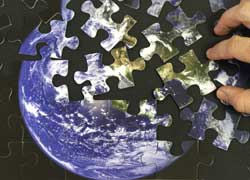 I was a bit stunned when I read a few days ago an American scholar suggesting that if Pakistan and US government cut links, “a cooling-off period could even lead to renewed ties”. Has PTI opened an office in Washington, DC? Thankfully, the answer to that question is no. Then I noticed that the writer is from the same think tank that recently hosted Gen sahib’s historical amnesia speech. Unfortunately, the case may be that this is writer is listening to the various ‘analysts’ who peddle this belief that isolating Pakistan is the path to progress.
I was a bit stunned when I read a few days ago an American scholar suggesting that if Pakistan and US government cut links, “a cooling-off period could even lead to renewed ties”. Has PTI opened an office in Washington, DC? Thankfully, the answer to that question is no. Then I noticed that the writer is from the same think tank that recently hosted Gen sahib’s historical amnesia speech. Unfortunately, the case may be that this is writer is listening to the various ‘analysts’ who peddle this belief that isolating Pakistan is the path to progress.
International Secretary of Pakistan Trade Union Defence Campaign wrote in Daily Times over the weekend that “In an epoch where there is a world economy and a world market, the chances of escaping from the crushing domination of US imperialism are bleak”.
Things don’t have to be so bleak.
While it is true that the US is the world’s largest power in terms of economy, it is not an isolated and self-contained. American politicians are presently dead locked on how to manage the country’s $14 trillion national debt. A record number of Americans want US troops pulled out of Afghanistan. No matter how much money certain people are making from telling that the hidden hand of US hegemony is knocking on the door, the facts say that the US has its own problems and is not interested in taking on responsibility for a new colony of 180 million Pakistani Muslims.
But what about those countries that are already making agreements and cultivating relationships with the US? Aren’t they being pounded under Washington’s iron fist? Hardly so.
The obvious example to mention is China which is seen by many as a rising global power that could even replace the US on the top of the rankings someday. China and the US are closely intertwined and work together on mutual interests approaching disagreements through dialogue and compromise. Both countries see the future as one of close relations between the two nations. Yet even these two play spy games with one another, and no one would dare say that China is bowing under US pressure.
Turkey, which I wrote about last week, is also integrated into the world community without suffering any ‘crushing domination of US imperialism’. Actually, the US has openly welcomed Turkey as a rising leader. And in case you think that Turkey has paid for this honour by becoming a puppet of some US-Zionist hegemony, please to recall that Turkey is taking a hard stance on Israel
Even Cuba which has been a symbol of resistance to Western capitalist hegemony is looking at ‘upgrading’ the national system. This is because after decades of isolation, the revolutionaries there are realising that they can bring their country into the new era without leaving their principles behind.
Changing for the better doesn’t imply betraying principles. By maintaining distances and differences within the core of the revolution, we have also changed – some more than others. Certainly, we will only be able to achieve reconciliation through all of the camps changing more. But it will always be important to define the direction of the change.
The feeling of love for Cuba, for the Cuba that Marti dreamt (free, democratic, with distributed ownership) could be the key to success of the dialogue.
Change ‘Pakistan’ for ‘Cuba’ and ‘Jinnah’ for ‘Marti’ and the same holds true does it not? Being true to nationalist principles does not mean refusing to change. There is only one thing that does not change, and that is death. Life changes and adapts, and so must nations.
Sadiq Saleem wrote that all this anti-Americanism misses the point that realism and pragmatism have always moved Pakistan ahead, while ignoring these principles has set us back every time. Munir Attaullah who is a successful businessman sees a bright future for Pakistan, but only if we “re-integrate with the international community rather than thumb our noses at it”.
China, Turkey, and many other nations are fully engaged and integrated into the world community and doing rather well for themselves without suffering ‘the crushing domination of US imperialism’. There’s no reason Pakistan can’t do the same.
![]()





